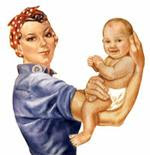- Marketing Portfolio. Create a Marketing Portfolio with examples of your works, business card, and some personal touches that are truly you and mail it to the hiring manager. Include a letter that asks for the interview and a time when you will follow up with them. I suggest that you either research the business section of your local newspaper or send this portfolio to your newly found network. An example of a Marketing Portfolio for a Public Relations Assistant could include an invitation he created for a local fundraiser gala, several press releases that include the AP style, a brochure that he created, a copy of his business card, and a personal letter that outlines his experience, asking for the job, and when he will be contacting the hiring manager to follow up. Yes, it's a lot of work, but this Portfolio makes a huge impression. I would be impressed, and even if this candidate was not hired, I would be more likely to refer him to a networking contact. A friend of mine is a radio DJ. He was interested in working for a particular radio station and sent his Marketing Portfolio in a shoe. He made an impression and was offered the job.
- Cocktail Networking Party. Get some friends and networking contacts together and invite them to a Networking Cocktail Party. Host it at your home and choose a theme like the roaring 20's. Shamelessly plug that you are in the job market and watch the doors open. Ask each of your invitees to bring a friend or contact to help you in the job hunt. Be budget conscious and ask close friends to each bring a finger food dish and drink of choice. Make your own invitations and send via email. A cute and memorable guest gift could be a wine glass with your business card attached reminding your friend or peer why they are really here.
- Place a Billboard Ad. A billboard is a great way to get noticed and grab the attention of a hiring manager when they least expect it. You have their undivided attention for 15 seconds on their daily commute. I'm not talking about breaking the bank and running an ad with a several large high tech television billboards. Those can easily run $10K a mo. I have several billboards right now that are very budget friendly running at $350/mo. each. This doesn't include the production cost of the banner that covers the billboard, but depending on your negotiating skills, you could work out a deal with the billboard company.
I've chosen 3 very distinct ways to give you an edge in the job hunt. Not all ideas will work for you. Use your creativity. Maybe it means stepping up your networking or volunteering at an agency for the holidays.
Next time. . . The Marketing Plan Revisited





